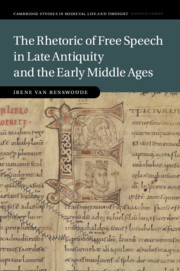Book contents
- The Rhetoric of Free Speech in Late Antiquity and the Early Middle Ages
- Cambridge Studies in Medieval Life and Thought Fourth Series
- The Rhetoric of Free Speech in Late Antiquity and the Early Middle Ages
- Copyright page
- Dedication
- Contents
- Acknowledgements
- Abbreviations
- Introduction
- Part I
- Part II
- Bibliography
- Index
Introduction
Published online by Cambridge University Press: 23 September 2019
- The Rhetoric of Free Speech in Late Antiquity and the Early Middle Ages
- Cambridge Studies in Medieval Life and Thought Fourth Series
- The Rhetoric of Free Speech in Late Antiquity and the Early Middle Ages
- Copyright page
- Dedication
- Contents
- Acknowledgements
- Abbreviations
- Introduction
- Part I
- Part II
- Bibliography
- Index
Summary
The introduction offers a brief history of free speech in Antiquity, which serves as a background for the chapters of this book. It starts with the emergence of free speech (parrhesia) as a civic and political virtue in the Greek world, in connection with the rise of democracy. It then continues with the Roman world, where free speech became embedded in Roman oratory and was included among the rhetorical figures in handbooks of rhetoric. It addresses the close connection between free speech and citizenship in Roman thought. In the second century AD, a Christian rhetoric of free speech came into being. The introduction shows how, over the course of the centuries, free speech spread from the political and the judicial to the moral and the religious sphere. In spite of these shifts, free speech retained its importance as a tool of political criticism.
- Type
- Chapter
- Information
- Publisher: Cambridge University PressPrint publication year: 2019

